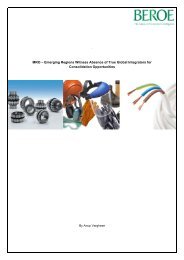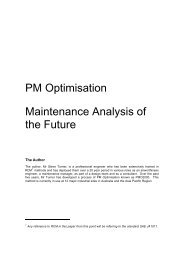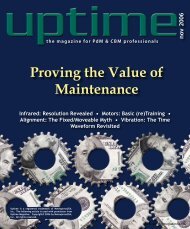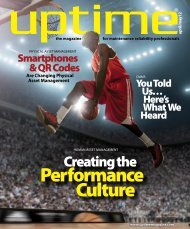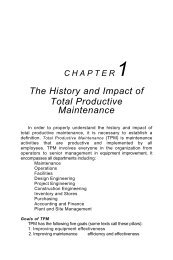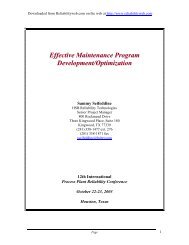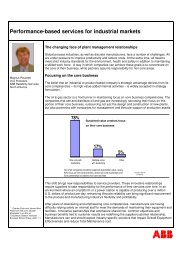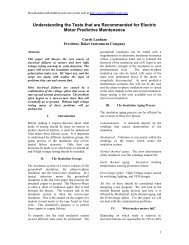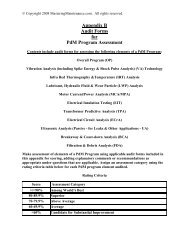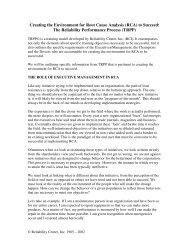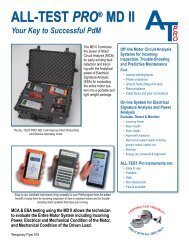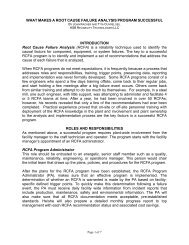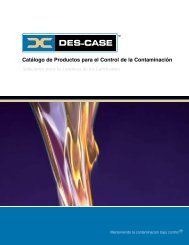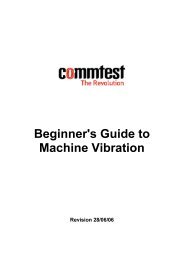Download the 2011 Edition (PDF) - ReliabilityWeb.com
Download the 2011 Edition (PDF) - ReliabilityWeb.com
Download the 2011 Edition (PDF) - ReliabilityWeb.com
Create successful ePaper yourself
Turn your PDF publications into a flip-book with our unique Google optimized e-Paper software.
EXCELLENCE<br />
What is excellence To many maintenance reliability<br />
professionals, excellence is <strong>com</strong>pleting more than 85 percent<br />
of <strong>the</strong> work planned, <strong>com</strong>pliance with over 90 percent of <strong>the</strong><br />
schedule and <strong>com</strong>pleting at least 95 percent of <strong>the</strong> PM. But ask yourself<br />
if that definition is shared in <strong>the</strong> ivory towers of your organization<br />
If not, what is <strong>the</strong> boss’s definition of excellence If you want<br />
to be considered a valued contributor with job security,<br />
shouldn’t you know<br />
We can argue about <strong>the</strong> definition of value.<br />
However, in <strong>the</strong> corner offices of corporate<br />
management, value has only one meaning:<br />
dollars! If it can’t be monetized or show up<br />
on a profit and loss statement, it doesn’t have<br />
value. Returning to <strong>the</strong> original question,<br />
do planned work, schedule <strong>com</strong>pliance and<br />
PM <strong>com</strong>pletion have monetary value They<br />
probably do, but try to convince a financial<br />
executive, who is under extreme profit<br />
pressure from a board of directors and<br />
shareholders. The vision isn’t <strong>the</strong>re.<br />
In order to thrive, we must reorient<br />
our thinking to conform to that<br />
of corporate chieftains. They<br />
certainly aren’t going to reorient<br />
<strong>the</strong>ir thinking to us. What does<br />
that mean First, we must be<br />
recognized as fulfilling a vital role by producing demonstrable business<br />
values within operational excellence. If you don’t know what operational<br />
excellence is, you’d better find out, because your masters of industry are<br />
probably thinking about implementation! Second, we must shift our<br />
sights to results that can be shown to have real monetary value instead of<br />
measures that may generate all <strong>the</strong> excitement of <strong>the</strong> flu in<br />
<strong>the</strong> stratosphere of your <strong>com</strong>pany:<br />
1. Focusing on declining lifetime cost and failure rates<br />
— ra<strong>the</strong>r than on PdM, PM and work effectiveness<br />
2. Achieving optimal system availability — ra<strong>the</strong>r<br />
than equipment MTBF<br />
3. Showing <strong>the</strong> percentage of RCA<br />
re<strong>com</strong>mendations that succeeded in preventing<br />
subsequent events — ra<strong>the</strong>r than analyses<br />
<strong>com</strong>pleted<br />
Let’s measure and publicize <strong>the</strong> results of<br />
objectives that create business value, not<br />
activities that got you <strong>the</strong>re!<br />
John Mitchell has held leadership positions in <strong>the</strong><br />
reliability and maintenance field throughout his<br />
professional career of more than 40 years. He is <strong>the</strong><br />
author of two textbooks, most recently <strong>the</strong> Physical<br />
Asset Management Handbook. He is a Certified<br />
Maintenance and Reliability Professional, CMRP<br />
and member of <strong>the</strong> Vibration Institute.



